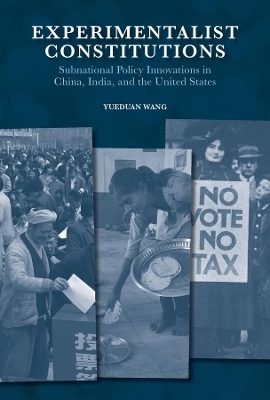
Experimentalist Constitutions
Subnational Policy Innovations in China, India, and the United States
Seiten
2024
Harvard University Press (Verlag)
978-0-674-29589-6 (ISBN)
Harvard University Press (Verlag)
978-0-674-29589-6 (ISBN)
In Experimentalist Constitutions, the first book that systematically compares subnational experimentalism in different countries, Wang argues that “laboratories of democracy” are not exclusive to the American system; instead, similar concepts apply in China and India, with different center–local structures and levels of political competition.
One of the most commonly cited virtues of American federalism is its “laboratories of democracy”—the notion that decentralization and political competition encourage states to become testing grounds for novel social policies and ideas. In Experimentalist Constitutions, the first book that systematically compares subnational experimentalism in different countries, Yueduan Wang argues that the idea of federal laboratories is not exclusive to the American system; instead, similar concepts can be applied to constitutions with different center-local structures and levels of political competition. Using case studies from China, India, and the United States, the book illustrates that these vastly different polities have instituted their own mechanisms of subnational experimentalism based on the interactions between each country’s constitutional system and partisan/factional dynamics. In this study, Wang compares and contrasts these three versions of policy laboratories and comments on their pros and cons, thus contributing to the discussion of these great powers’ competing models of development.
One of the most commonly cited virtues of American federalism is its “laboratories of democracy”—the notion that decentralization and political competition encourage states to become testing grounds for novel social policies and ideas. In Experimentalist Constitutions, the first book that systematically compares subnational experimentalism in different countries, Yueduan Wang argues that the idea of federal laboratories is not exclusive to the American system; instead, similar concepts can be applied to constitutions with different center-local structures and levels of political competition. Using case studies from China, India, and the United States, the book illustrates that these vastly different polities have instituted their own mechanisms of subnational experimentalism based on the interactions between each country’s constitutional system and partisan/factional dynamics. In this study, Wang compares and contrasts these three versions of policy laboratories and comments on their pros and cons, thus contributing to the discussion of these great powers’ competing models of development.
Yueduan Wang is Assistant Professor at the School of Government at Peking University.
| Erscheinungsdatum | 05.03.2024 |
|---|---|
| Reihe/Serie | Harvard East Asian Monographs |
| Verlagsort | Cambridge, Mass |
| Sprache | englisch |
| Maße | 152 x 229 mm |
| Gewicht | 522 g |
| Themenwelt | Recht / Steuern ► Allgemeines / Lexika |
| Recht / Steuern ► EU / Internationales Recht | |
| Recht / Steuern ► Öffentliches Recht | |
| Sozialwissenschaften ► Politik / Verwaltung ► Staat / Verwaltung | |
| ISBN-10 | 0-674-29589-7 / 0674295897 |
| ISBN-13 | 978-0-674-29589-6 / 9780674295896 |
| Zustand | Neuware |
| Informationen gemäß Produktsicherheitsverordnung (GPSR) | |
| Haben Sie eine Frage zum Produkt? |
Mehr entdecken
aus dem Bereich
aus dem Bereich
Organisationen steuern, Strukturen schaffen, Prozesse gestalten
Buch | Softcover (2024)
Rehm Verlag
38,00 €


